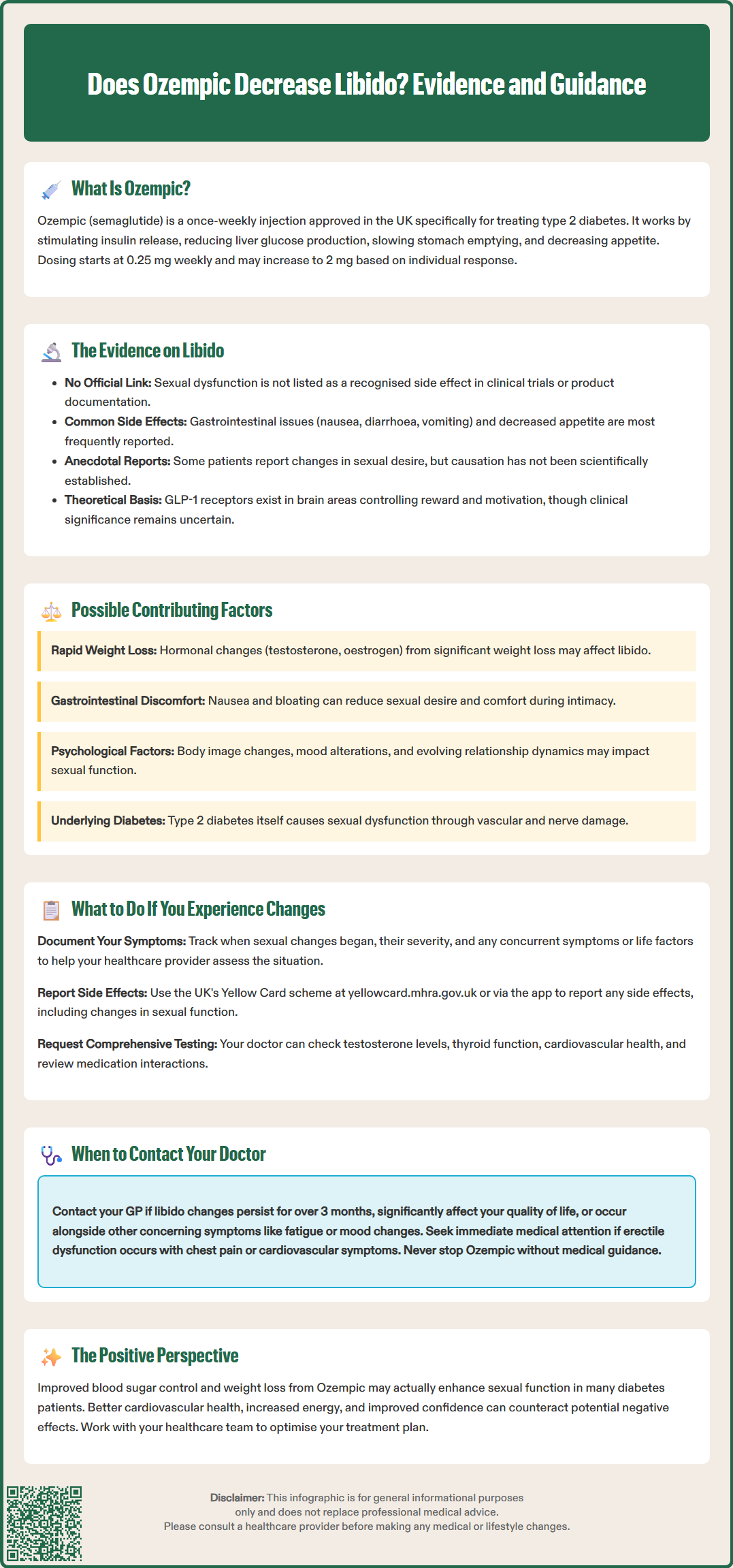
Ozempic (semaglutide) is a glucagon-like peptide-1 (GLP-1) receptor agonist licensed in the UK for managing type 2 diabetes mellitus. Whilst it effectively controls blood glucose and often leads to weight loss, some patients have raised concerns about potential effects on sexual function. Currently, decreased libido is not listed as an established side effect in the Summary of Product Characteristics, and clinical trial data do not confirm a direct link. However, anecdotal reports and the complex interplay between metabolic changes, weight loss, and underlying diabetes warrant careful consideration. This article examines the available evidence on whether Ozempic affects libido and what patients should know.
Quick Answer: There is currently no established clinical evidence that Ozempic (semaglutide) directly decreases libido, though anecdotal reports exist and further research is needed.

Mounjaro® is the most innovative GLP-1 medication proven to dramatically curb appetite, hunger, and cravings to help professional men achieve substantial weight loss.
Start Here
Wegovy® is a weekly injectable GLP-1 medication with proven effectiveness in reducing appetite, hunger, and cravings to help busy professionals lose significant weight.
Start HereOzempic (semaglutide) is a prescription medication licensed in the UK for the treatment of type 2 diabetes mellitus. It belongs to a class of drugs known as glucagon-like peptide-1 (GLP-1) receptor agonists, which work by mimicking the action of a naturally occurring hormone that regulates blood glucose levels.
The mechanism of action of Ozempic involves several key processes:
Stimulating insulin secretion from pancreatic beta cells in a glucose-dependent manner, meaning insulin is released only when blood sugar levels are elevated
Suppressing glucagon release, which reduces glucose production by the liver
Slowing gastric emptying, which helps control post-meal blood sugar spikes
Reducing appetite through effects on brain centres that regulate hunger and satiety
Ozempic is administered as a once-weekly subcutaneous injection into the abdomen, thigh, or upper arm. The typical dosing schedule begins with 0.25 mg once weekly for 4 weeks (as an initial dose for tolerability adjustment), then increases to 0.5 mg once weekly. The dose may be further increased to 1 mg and then 2 mg at intervals of at least 4 weeks, based on individual glycaemic response and tolerability. The MHRA has approved semaglutide for type 2 diabetes management only, not for type 1 diabetes or diabetic ketoacidosis.
In clinical trials (SUSTAIN-6), semaglutide demonstrated cardiovascular benefits in patients with type 2 diabetes at high cardiovascular risk, though its licensed indication in the UK remains specifically for glycaemic control in type 2 diabetes.
Whilst Ozempic is prescribed for diabetes management, decreased appetite is a common side effect that often leads to weight reduction. This secondary benefit has generated public interest, though it's important to note that in the UK, a higher-dose formulation (Wegovy) is specifically licensed for weight management in certain patient groups. Understanding how Ozempic works provides essential context for exploring its potential effects on various aspects of health, including sexual function.

The relationship between Ozempic and sexual function, including libido, remains an area where clinical evidence is limited and somewhat unclear. Currently, there is no official, established link between semaglutide and decreased libido documented in the drug's Summary of Product Characteristics (SmPC) or major clinical trials. Sexual dysfunction is not listed as an adverse reaction in the UK SmPC for semaglutide.
In the pivotal SUSTAIN clinical trial programme that led to Ozempic's approval, sexual dysfunction or changes in libido were not reported as common adverse effects. According to the SmPC, the most frequently documented side effects include:
Gastrointestinal symptoms (very common: nausea, diarrhoea; common: vomiting, constipation, abdominal pain)
Decreased appetite (common)
Hypoglycaemia (common, particularly when combined with insulin or sulphonylureas)
Less frequent side effects include dizziness, fatigue and injection site reactions.
However, anecdotal reports from patients and some healthcare professionals have suggested possible changes in sexual desire during Ozempic treatment. It's crucial to understand that establishing causation is complex, as multiple factors may be at play.
The MHRA's Yellow Card scheme allows patients and healthcare professionals to report suspected side effects. If you experience any side effects, including changes in sexual function, you should report them via the Yellow Card scheme at yellowcard.mhra.gov.uk or via the Yellow Card app. Ongoing pharmacovigilance continues to monitor for emerging safety signals.
It's worth noting that GLP-1 receptors are present in various tissues throughout the body, including some areas of the brain involved in reward and motivation pathways. Whilst the clinical significance of this for sexual function remains uncertain, it provides a theoretical basis for potential effects. Nevertheless, without robust clinical evidence, any connection between Ozempic and libido changes should be considered unconfirmed and requires further research to establish whether a genuine pharmacological relationship exists.
If sexual changes do occur during Ozempic treatment, several indirect mechanisms may be responsible, rather than a direct pharmacological effect on sexual function. These potential contributing factors are largely theoretical in the context of semaglutide treatment and not well-established.
Potential metabolic and physical factors that might influence libido include:
Weight loss effects: Significant and rapid weight reduction may affect hormone levels, including testosterone and oestrogen, which play crucial roles in sexual desire. Substantial metabolic changes could theoretically influence the hypothalamic-pituitary-gonadal axis
Nutritional considerations: Markedly reduced food intake might lead to inadequate consumption of nutrients that support hormone production and energy levels, particularly with severe appetite suppression
Gastrointestinal side effects: Persistent nausea, bloating, or digestive discomfort (common with semaglutide) can understandably diminish sexual desire and comfort during intimacy
Dehydration and low energy: Gastrointestinal side effects may lead to fluid loss and reduced energy levels that could affect overall wellbeing
Psychological and emotional factors are equally important:
Body image changes: Whilst weight loss is often desired, rapid physical changes can affect self-perception and confidence, potentially impacting sexual relationships
Mood alterations: Changes in eating patterns, blood sugar fluctuations, and adjustment to medication may influence mood and emotional wellbeing
Relationship dynamics: Weight loss and lifestyle changes can alter relationship patterns and communication around intimacy
Underlying health conditions must also be considered. Type 2 diabetes itself is associated with sexual dysfunction in both men and women due to vascular changes, neuropathy, and hormonal imbalances. Importantly, improved glycaemic control, weight reduction, and better management of blood pressure and lipids with semaglutide treatment may actually improve sexual function in many people with type 2 diabetes. Additionally, many patients taking Ozempic use other medications (antihypertensives, antidepressants, statins) that may independently affect sexual function, making it challenging to attribute changes to any single agent.
If you notice changes in your sexual desire or function whilst taking Ozempic, it's important to approach the situation systematically and maintain open communication with your healthcare team. Sexual health is an important aspect of overall wellbeing and should not be dismissed or ignored.
Initial steps to consider:
Document the changes: Keep a record of when changes began, their severity, and any other symptoms or life changes occurring simultaneously. This information will help your GP or diabetes specialist assess the situation more effectively
Review your overall health: Consider whether other factors might be contributing, such as stress, relationship issues, sleep quality, or changes in other medications
Ensure adequate nutrition: If you've experienced significant weight loss, work with a dietitian to ensure you're meeting nutritional needs, particularly protein, healthy fats, and micronutrients essential for hormone production
Monitor for other symptoms: Note whether you're experiencing fatigue, mood changes, or other side effects that might indirectly affect sexual function
When to contact your GP or diabetes specialist:
If libido changes are persistent, distressing, or affecting your quality of life
If erectile dysfunction persists for more than 3 months, is sudden or severe, or occurs with exertional chest pain or other cardiovascular symptoms
If you experience other concerning symptoms alongside sexual changes
If you're considering stopping Ozempic due to these effects
Red flag symptoms requiring prompt medical attention include erectile dysfunction with chest pain or cardiovascular symptoms, as erectile dysfunction can be a marker of vascular disease.
Your healthcare provider can conduct a comprehensive assessment, which may include:
Reviewing your medication regimen for potential interactions or contributing factors
Checking relevant blood tests: HbA1c, lipid profile, morning total testosterone (in men), thyroid function, and renal function
Conducting a cardiovascular risk assessment, particularly for men with erectile dysfunction
Assessing diabetes control and whether adjustments to your treatment plan might help
Discussing whether the benefits of Ozempic outweigh any side effects you're experiencing
Exploring alternative diabetes medications if appropriate
NICE guidance emphasises patient-centred care and shared decision-making in type 2 diabetes management. Never stop Ozempic abruptly without medical advice, as this may affect your diabetes control. Your healthcare team can help you weigh the benefits of improved glycaemic control and weight management against any potential side effects, and work with you to find the most suitable treatment approach for your individual circumstances.
No, decreased libido is not listed as an established side effect in the UK Summary of Product Characteristics for Ozempic, and clinical trials have not confirmed a direct link between semaglutide and sexual dysfunction.
Significant weight loss may theoretically influence hormone levels such as testosterone and oestrogen, which play roles in sexual desire, though this relationship is not well-established with semaglutide treatment.
Contact your GP or diabetes specialist for a comprehensive assessment, including review of medications, relevant blood tests, and discussion of whether the benefits of Ozempic outweigh any side effects. Do not stop Ozempic without medical advice.
All medical content on this blog is created based on reputable, evidence-based sources and reviewed regularly for accuracy and relevance. While we strive to keep content up to date with the latest research and clinical guidelines, it is intended for general informational purposes only.
DisclaimerThis content is not a substitute for professional medical advice, diagnosis, or treatment. Always consult a qualified healthcare professional with any medical questions or concerns. Use of the information is at your own risk, and we are not responsible for any consequences resulting from its use.